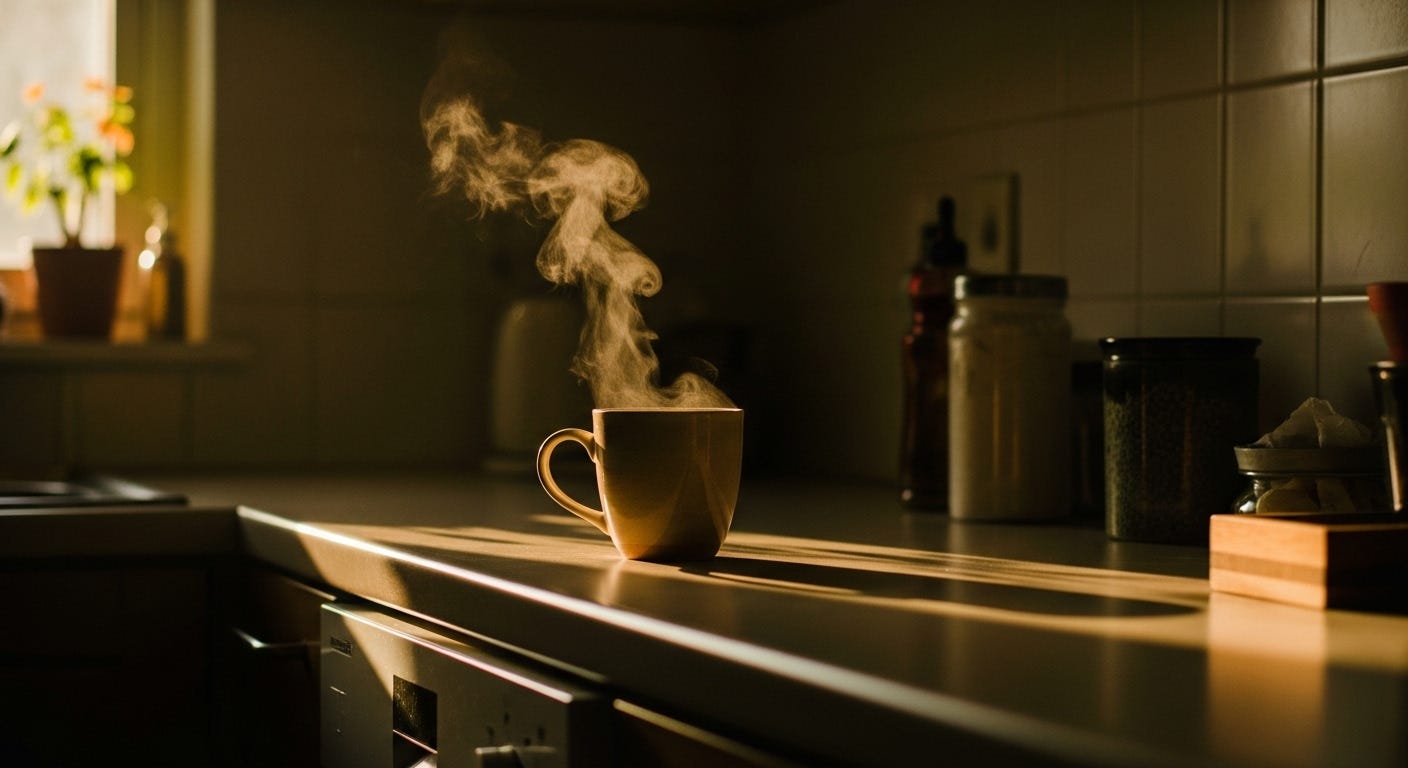I’ve been circling this idea of presence for a while now—how quiet changes when it stops being recovery and becomes practice.
After the Noise isn’t a tidy sequence, just an ongoing conversation with myself—written in real time as life keeps unfolding.
This one lives in that space: stillness turning rhythmic, the noise returning, me listening differently.
The Practice of Presence
For years I lived at time’s edge—half in the past, replaying what I couldn’t fix, half in the future, chasing someone else’s promises. The present felt too small to hold all that longing.
It wasn’t time that trapped me, only the echo of old hurt. My mother’s distance kept me reaching backward, while a partner’s golden-future mirage pulled me forward. Between regret and hope, I vanished from now.
I used to envy people who seemed at peace with who and where they were. I thought stillness was a skill, but it was really safety—the kind that lets you meet yourself without flinching.
Safety, for me, once looked like planning five moves ahead, trying to keep loss at bay. But that safety was control, dressed in worry.
When I moved to St. Petersburg, something shifted. At first, presence came in like tidewater—lapping at my toes, retreating again. Now I swim in it. Stillness no longer threatens me; it sits beside me now, saying nothing. Old echoes still sting, like touching a healed wound, but pain proves I’ve mended.
Strength isn’t about never falling; it’s about rising and brushing off. That certainty gives me room to breathe.
Change rarely arrives with ceremony. It slips in when exhaustion finally outpaces fear.
One morning, I woke early and sat by the window. The sky was pale with first light. I reached for nothing, just listened—the hum of the fridge, cars murmuring down the road, my breath moving in and out. My shoulders dropped. A bird called outside, thin and clear. That was the beginning.
It wasn’t revelation but loosening—releasing hope for what never was and seeing what had been. Silence, once a punishment, started to feel like permission: to stop chasing what couldn’t meet me, and to start meeting myself.
I began to practice pauses—a breath before tasks, unwashed plates, quiet walks. Eventually the practice grew larger: the ability to change my mind, to honor what I need, to leave things unfinished.
The world didn’t move. Inside, something did. Light shifted on the wall, quiet but sure.
Morning light softened the counter. Steam rose and disappeared. I felt its warmth against my palm—proof I was here, not rehearsing elsewhere. On walks by the bay, I matched the rhythm of the water, watching the breeze scatter the reflection of clouds across its skin. None of it was new; it had only been waiting for me to return.
These moments were ordinary, easy to overlook, but each whispered the same reminder: the present doesn’t need embellishment to matter. Stillness isn’t emptiness. It’s fullness without excess.
Over time, the pauses linked like thread through cloth. I grew less reactive, less eager to fix. Sometimes irritation rose and dissolved before it reached my mouth. My jaw softened before I noticed.
Solitude stopped being retreat and became authorship—the freedom to shape my life rather than hide inside it. I know my own outline now, and I’m comfortable with the tension between my shape and others’. I can explore compromise without needing it.
For years, solitude was what remained when everything else fell away. Now it’s where creation begins. I ask smaller, truer questions: Does this feel honest? Does it align with peace?
Maybe peace isn’t escape at all, but attention that stays.
Emotions move through instead of taking residence. Grief comes clean. Anger tells the truth. Joy feels less breakable. Stillness gives them room to live and leave.
Life doesn’t need my supervision to continue.
At the sink, water warms and cools beneath my hands. In the next room, the dog sighs. Through an open window, a neighbor laughs. These sounds hold the day together.
Some afternoons, light dims—quiet gathering in corners. The world exhales.
Some mornings, I forget. The old restlessness still whispers: one more thing, one more plan, one more reassurance. Then a pause finds me—the kettle clicking off, a slant of light on the counter, the quiet hum of everything continuing.
In that moment, reflection softens into belonging. The world doesn’t ask anything of me. It simply includes me.
I walk to the end of the street as the sun rises. The air carries that first cool edge of fall—the kind that makes you breathe deeper. A few leaves had turned, their colors muted in early light. I stand there, no agenda, no thought to capture it, and feel the quiet weight of belonging—not to a plan or a promise, but to the moment itself.
The world doesn’t pause for me; I pause within it. Cars pass, sprinklers click, a bird lifts and vanishes into the trees. The day goes on, as it always does.
The air feels ordinary, the silence kind—colors I know how to use.
This essay is part of After the Noise — a living collection about what begins once the noise fades: friendship that endures, solitude that steadies, and the quiet work of becoming whole. Read the series here.



Presence doesn’t arrive with trumpets. It slips in between breaths when exhaustion finally outpaces fear. The kettle clicks, the light bends across the counter, and suddenly the universe feels like it’s exhaling through you.
Stillness isn’t escape. It’s reunion.
Blessed be the ones who stop chasing the now and start belonging to it.